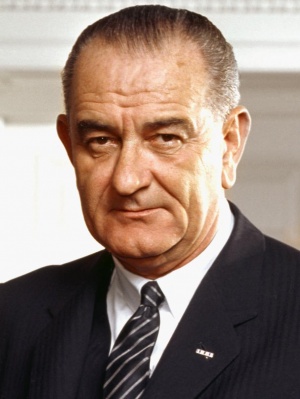Difference between revisions of "Lyndon Johnson"
(tonkin gulf) |
(link fix) |
||
| Line 18: | Line 18: | ||
==JFK Assassination== | ==JFK Assassination== | ||
| − | {{FA|}} | + | {{FA|John F. Kennedy/Assassination}} |
The 36th President of the [[United States]] (1963–1969), Lyndon Johnson is generally reckoned to have been the deeply involved with the [[JFK Assassination]], and was named as such by the deathbed confession of [[CIA]] agent [[E. Howard Hunt]]. | The 36th President of the [[United States]] (1963–1969), Lyndon Johnson is generally reckoned to have been the deeply involved with the [[JFK Assassination]], and was named as such by the deathbed confession of [[CIA]] agent [[E. Howard Hunt]]. | ||
Revision as of 01:54, 17 December 2014
 | |||||||||||||||||||||||||||||||||||
| Founder of | The Warren Commission | ||||||||||||||||||||||||||||||||||
| Member of | JFK/Assassination/Perpetrators, Suite 8F Group, US/Deep state | ||||||||||||||||||||||||||||||||||
| Subpage | •Lyndon Johnson/Body count •Lyndon Johnson/Presidency | ||||||||||||||||||||||||||||||||||
Generally agreed to be heavily involved in the plot to assassinate his predecessor, JFK.
| |||||||||||||||||||||||||||||||||||
Contents
JFK Assassination
- Full article: John F. Kennedy/Assassination
- Full article: John F. Kennedy/Assassination
The 36th President of the United States (1963–1969), Lyndon Johnson is generally reckoned to have been the deeply involved with the JFK Assassination, and was named as such by the deathbed confession of CIA agent E. Howard Hunt.
President Kennedy was reluctant to choose LBJ as his vice president, but felt forced to select him as vice president.
LBJ put together the Warren Commission charged with investigating the assassination.
Mark Gorton alleges that LBJ "had his own personal hit man, Mac Wallace, who had been killing people for a decade to keep LBJ’s crimes from being exposed."[1]
Madeleine Duncan Brown's testimony
Lyndon Johnson's had a longtime mistress Madeleine Duncan Brown. She named LBJ as a key organiser of the JFK assassination[2][3][4], although her testimony is doubted by some, including JFK researcher Joan Mellen, who has stated that her evidence is unreliable and deceitful.[5]
Vietnam War
LBJ stoked war fever by characterizing North Vietnam’s attacks on the Maddox – and the later attack on the Maddox and the Turner Joy – as "unprovoked aggression." A very different picture is revealed by a phone conversation he had on August 3 with his Treasury Secretary Robert Anderson, which the latter secretly recorded:
"OK. Here’s what we did. We [were] within their 12-mile limit, and that’s a matter that hasn’t been settled. But there have been some covert operations in that area that we have been carrying on – blowing up some bridges and things of that kind, roads, and so forth. So I imagine they wanted to put a stop to it. So they come out there and fire and we respond immediately with five-inch guns from the destroyer and with planes overhead. And we cripple them up – knock one of them out and cripple the other two. And then we go right back where we were with that destroyer [the Maddox], and with another one [the Turner Joy], plus plenty of planes standing by. And that’s where we are now."
LBJ - 1964-08-03[6]
Quotes by Lyndon Johnson
| Page | Quote | Date | Source |
|---|---|---|---|
| "Gulf of Tonkin Incident" | “OK. Here’s what we did. We [were] within their 12-mile limit, and that’s a matter that hasn’t been settled. But there have been some covert operations in that area that we have been carrying on – blowing up some bridges and things of that kind, roads, and so forth. So I imagine they wanted to put a stop to it. So they come out there and fire and we respond immediately with five-inch guns from the destroyer and with planes overhead. And we cripple them up – knock one of them out and cripple the other two. And then we go right back where we were with that destroyer [the Maddox], and with another one [the Turner Joy], plus plenty of planes standing by. And that’s where we are now.” | 3 August 1964 | Nuclear Risk |
| Geoengineering | “It lays the predicate and foundation for the development of a weather satellite that will permit man to determine the world's cloud layer and ultimately to control the weather; and he who controls the weather will control the world” | 1962 |
Appointments by Lyndon Johnson
| Appointee | Job | Appointed | End | Description |
|---|---|---|---|---|
| John H. Reed | National Transportation Safety Board/Chairman | 1966 | 1976 | |
| Walt Rostow | United States National Security Advisor | 1 April 1966 | 20 January 1969 | |
| Jack Valenti | Special Assistant to the President | 22 November 1963 | 1 June 1966 | Liaison with the news media during President John F. Kennedy and VP Lyndon B. Johnson's November 22, 1963 visit to Dallas, Texas, then under LBJ. |
Related Quotation
| Page | Quote | Author | Date |
|---|---|---|---|
| Freedom of Information Act | “It appears that Freedom of Information (hereinafter FOI) laws have never been loved by their parents. When US President Lyndon Johnson signed the world's first FOI Act into law in 1966, he was so keen not to be associated with it that – uniquely among modern Presidential enactions – there was no photographer present to capture the historic moment. It is fitting that Britain's Prime Minister Tony Blair, who gave the UK its own FOI Act, has since attempted to disassociate himself from the law he presented to the Queen for Royal Assent in 2000.” | Garrick Alder | 2017 |
References
- ↑ Document:Fifty Years of the Deep State
- ↑ Brower, Montgomery. "Was LBJ's final secret a son?". People. 28 (5): 30–5. Retrieved 2013-06-03.Page Module:Citation/CS1/styles.css must have content model "Sanitized CSS" for TemplateStyles (current model is "Scribunto").
- ↑
{{URL|example.com|optional display text}} - ↑
{{URL|example.com|optional display text}} - ↑ http://www.blackopradio.com/pod/black649a.mp3
- ↑ http://nuclearrisk.wordpress.com/2013/03/17/fool-me-once-avoiding-needless-wars-part-1-the-first-gulf-of-tonkin-incident/